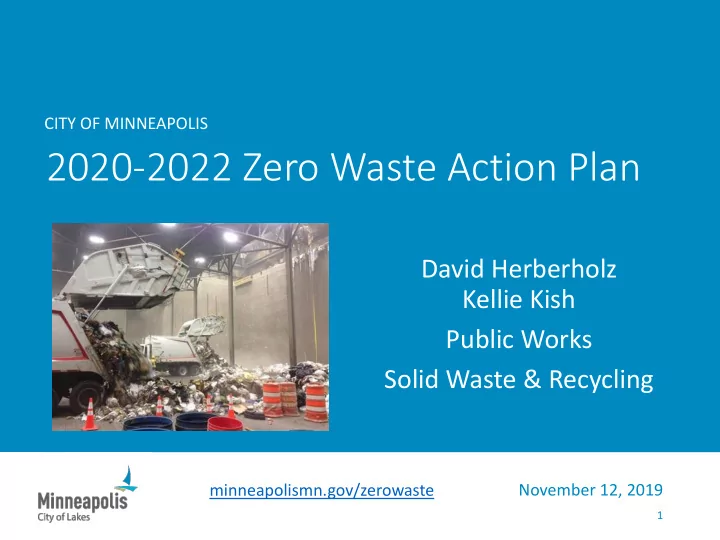

CITY OF MINNEAPOLIS 2020-2022 Zero Waste Action Plan David Herberholz Kellie Kish Public Works Solid Waste & Recycling minneapolismn.gov/zerowaste November 12, 2019 1
Timeline June 2015 Council adopted recycling and composting goals Sept. & Oct. Engagement meetings for residential, multi-family 2016 and commercial sectors May 2017 City’s Commercial Waste Study released Sept. 7, 2017 Draft zero-waste plan released to public Dec 8, 2017 Zero Waste Plan approved by Council May, 2018 3 year Zero Waste Action Plan engagement meetings Nov, 2018 Hennepin County adopted changes to Solid Waste Ordinance 13 Nov, 2019 Zero Waste Action Plan updated 2
Why zero waste? • City adopted recycling and composting goals of 50% by 2020 and 80% by 2030. Achieve zero-percent increase in total waste generated from 2010 levels. • Keep valuable materials out of waste-to-energy facility and landfills • Reduces greenhouse gases • Increases economic activity • ($3.48 billion in total estimated gross economic activity, MPCA 2001 data) • Creates jobs • (10 jobs in recycling for every 1 job in disposal) • SW&R directed to take lead on ZWAP in partnership with Health, Regulatory Services, and CPED. 3
Construction & Demolition Debris (C&D) is a separate section in the ZWP as it crosses all sectors. 4
5
Focus for 2020-2022 Action Plan • Data collection • Establish baseline and evaluate progress • Develop understanding of existing conditions • Current waste diversion programs • Opportunities for improvements • Promote resources available to incentivize waste diversion • Solid Waste Management Taxes and Fees • Hennepin County resources • Free technical assistance, signage, grant programs and more 6
Action items for all sectors 1. Education and outreach for waste reduction, reuse/repair, recycling, organics, etc. 2. Promote Hennepin County assistance, resources and grants 3. Encourage to use Hennepin County styled signage 7
Residential action items • Residential capture rate study • Evaluate amount of available materials being diverted • South Transfer Station study • Create a voucher program for residents participating in organics program to have access to finished compost 8
Commercial and multi- family action items • Actively enforce existing ordinances • Modify hauler license to identify what materials are collected by each hauler • Evaluate hauler reporting to the state • Organics • Evaluate building code requirements for organics collection plans (or chutes) at multi-family and mixed- use buildings that have chutes (2020) • Evaluate option to require organics program upon request of a certain number of residents (2020) • Evaluate adding additional organics drop-off sites (2020) 9
Next steps • Will work with partners to not duplicate efforts • Residents, businesses, haulers and other stakeholders will continue to be engaged before new strategies are implemented 10
Questions? CITY OF MINNEAPOLIS David Herberholz Kellie Kish Public Works Solid Waste & Recycling minneapolismn.gov/zerowaste November 12, 2019 11
Recommend
More recommend